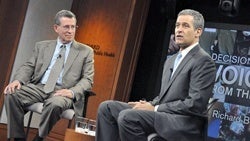October 6, 2011 — As acting head of the U.S. Centers for Disease Control and Prevention during the beginning of the Obama administration, Richard Besser learned the importance of balancing public health needs with political realities during a critical public health crisis—the H1N1 (“swine flu”) pandemic.
A medical doctor who is currently senior health and medical editor for ABC News, Besser shared his on-the-job experiences with Harvard School of Public Health students on Sept. 28, 2011 as part of the Division of Policy Translation and Leadership Development’s lecture series “Decision-making: Voices From the Field.”
After the CDC recommended a two-week shutdown for any school with a suspected or confirmed case of H1N1, Besser realized that wasn’t the wisest move. He’d made what he considered a prudent decision, but he had done so without an essential “political layer”—the Secretary of Health and Human Services, Katherine Sebelius, had yet to be confirmed, and so was not involved in the decision-making process.
So when Education Secretary Arne Duncan learned of the recommendation, he wasn’t pleased because of the practical problems it posed—like where kids would go instead of school, what working parents would do, and whether the school lunch program could somehow provide food for kids at home.
“There were issues that went way beyond the science,” Besser said.
After conferring with Besser, Obama administration officials came up with a new recommendation: a one-week school closure followed by a reassessment. The episode taught Besser how essential it is that technical leaders in government, such as doctors or scientists, take practical policy considerations into account when making decisions.
Although it was impossible to predict how H1N1 would play out, CDC officials chose an aggressive response “because with an emerging infection, if you’re not aggressive up front, you might lose the opportunity for containment,” said Besser. He and his colleagues also decided to “tell people what we knew when we knew it; direct all of our activities toward reducing morbidity and mortality in this country; and base all of our actions on the best available science.” To insure they had the trust of the American public, they also decided to grant every media interview request and hold regular briefings.
It was a challenge, he said, to communicate vital public health information—which often includes complex nuances—while keeping information clear enough for the average citizen. “It was a very difficult thing to balance,” he said.
When ABC top brass, impressed with Besser’s television presence during the H1N1 crisis, offered him his current job, Besser said his first thought was, “No, that’s ridiculous—I’m a public health person.” But after thinking about it, he realized that television would allow him to reach 12 to 14 million people on various public health issues. So he took the job.
One student in the audience asked Besser, “Where are the public health leaders today?” noting that the biggest “celebrity” public health spokesman he could remember was former surgeon general C. Everett Koop, who served from 1982 to 1989 during the Reagan Administration.
Besser acknowledged that there’s a void in public health leadership today. “All I seem to be hearing is the term ‘Obamacare’ being thrown around,” Besser said. “We’re not hearing our leaders talk about health the way they should.”
“What I’m trying to do at ABC News,” he said, “is practice public health from in front of the camera.”
–Karen Feldscher
photo: Aubrey LaMedica
